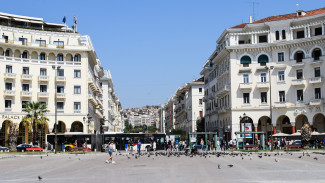
Who are you?
I´m Sava. My parents immigrated from Greece to Germany in the mid-1960s. For us ghetto kids from Darmstadt-Kranichstein, God existed, somehow. Jesus, however, was a tricky topic. Depending on where our parents came from, each of us had a completely different opinion about him. Then, eight years ago, my childhood friend Luke invited me to a youth group. Two long years later I knew that I wanted to follow Jesus and that I was ready for my baptism.
But I never wanted to have anything to do with Greece. That changed in 2018 in Uruguay. I was a staff member at a youth camp and like everyone else, I was asked by the leader to draw a map of the world. We should draw in where our ancestors came from. When I did this, I knew from God that I should become active in Greece.
Samy, my pastor, and others from our area will go there with me regularly.
What do you want to see?
When I was a child, I knew Jesus only from the icons, hanging on the Cross. Actually, to me there was no difference between a picture of Jesus and all the other icons that hung on the walls of our home. It was a huge discovery for me that it is still possible today to experience Jesus, to talk to him, and to have a living relationship with him. My wish for many people in Greece is that Jesus becomes relevant in their lives and that they experience personally what he has to offer them.
We´ve decided to start among students, then hopefully we can go with them to their hometowns and villages. In Thessaloniki we will be at one of the five universities during the day, and hopefully we will meet the students again at night in Ladadika, the party district directly on the Thermaic Gulf.
How did you get this idea?
For three summers, Samy (my pastor) was in Greece with a Christian organization. They went from door to door in villages to give people Bibles in modern Greek. The villagers had never held anything like it in their hands before. But . . . in one village, he saw a woman going from door to door behind them, collecting the Bibles again and throwing them after them. Everyone gave them back because of social pressure. In other villages, the Orthodox Papas (priests) were called, and all the Bibles were piled up and publicly burned.
These reactions made it clear to Samy that he should go toThessaloniki and other cultural centres first. Greeks who come to faith there can then go to their relatives in the provinces themselves. If Jesus is passed on by family members, then he isn´t a foreign religion.
I, Sava, am also moved by something else. I miss the Greek culture of pareia: just being together with people, having a coffee, with no time pressure. At the same time, I get really angry when I see the icons and statues because they hid the real Jesus from me for such a long time.
For the others who will be with us, Greece is the next step in their discipleship.
What challenges do you expect?
In some ways, we will be sixteen years late. When the German coach Otto Rehagel, Rehakles, led the Greek national team to win the European Championship in 2004, we Germans were really popular in Greece. That has changed dramatically since then. It won't be easy for some of our team to deal with all the rejection we will likely face.
None of us have ever gone to Greek universities and tried to share with the students there about Jesus. We will have to find out which thought-buildings in their minds are blocking them from understanding what we have to share. For example, will they understand that Jesus is separate from church?
What are you going to do?
We want to go to Thessaloniki four times a year. The first time will probably be in October. Until then we will pray together as a team and study the specifics of the Greek culture. I, Sava, want to improve my Greek.